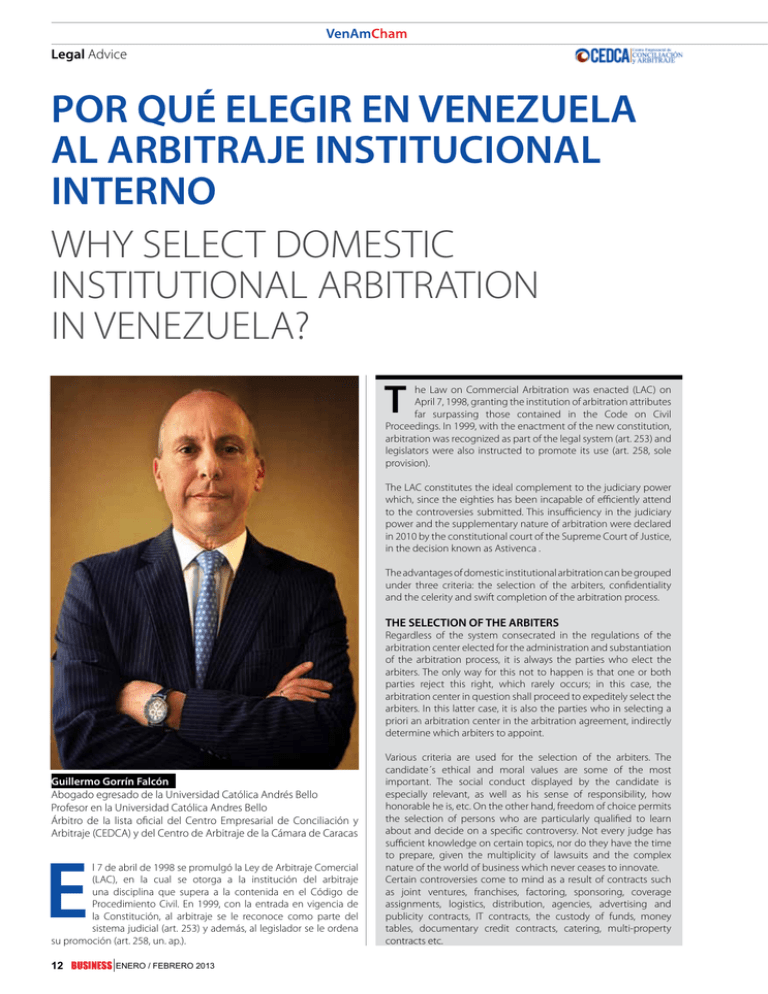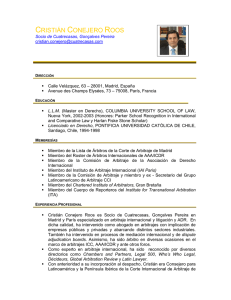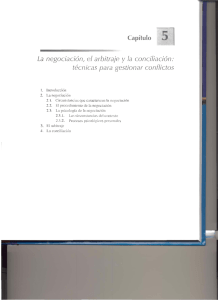¿Por qué elegir en Venezuela al arbitraje institucional
Anuncio

VenAmCham Legal Advice POR QUÉ ELEGIR EN VENEZUELA AL ARBITRAJE INSTITUCIONAL INTERNO WHY SELECT DOMESTIC INSTITUTIONAL ARBITRATION IN VENEZUELA? T he Law on Commercial Arbitration was enacted (LAC) on April 7, 1998, granting the institution of arbitration attributes far surpassing those contained in the Code on Civil Proceedings. In 1999, with the enactment of the new constitution, arbitration was recognized as part of the legal system (art. 253) and legislators were also instructed to promote its use (art. 258, sole provision). The LAC constitutes the ideal complement to the judiciary power which, since the eighties has been incapable of efficiently attend to the controversies submitted. This insufficiency in the judiciary power and the supplementary nature of arbitration were declared in 2010 by the constitutional court of the Supreme Court of Justice, in the decision known as Astivenca . The advantages of domestic institutional arbitration can be grouped under three criteria: the selection of the arbiters, confidentiality and the celerity and swift completion of the arbitration process. THE SELECTION OF THE ARBITERS Regardless of the system consecrated in the regulations of the arbitration center elected for the administration and substantiation of the arbitration process, it is always the parties who elect the arbiters. The only way for this not to happen is that one or both parties reject this right, which rarely occurs; in this case, the arbitration center in question shall proceed to expeditely select the arbiters. In this latter case, it is also the parties who in selecting a priori an arbitration center in the arbitration agreement, indirectly determine which arbiters to appoint. Guillermo Gorrín Falcón Abogado egresado de la Universidad Católica Andrés Bello Profesor en la Universidad Católica Andres Bello Árbitro de la lista oficial del Centro Empresarial de Conciliación y Arbitraje (CEDCA) y del Centro de Arbitraje de la Cámara de Caracas E l 7 de abril de 1998 se promulgó la Ley de Arbitraje Comercial (LAC), en la cual se otorga a la institución del arbitraje una disciplina que supera a la contenida en el Código de Procedimiento Civil. En 1999, con la entrada en vigencia de la Constitución, al arbitraje se le reconoce como parte del sistema judicial (art. 253) y además, al legislador se le ordena su promoción (art. 258, un. ap.). 12 ENERO / FEBRERO 2013 Various criteria are used for the selection of the arbiters. The candidate´s ethical and moral values are some of the most important. The social conduct displayed by the candidate is especially relevant, as well as his sense of responsibility, how honorable he is, etc. On the other hand, freedom of choice permits the selection of persons who are particularly qualified to learn about and decide on a specific controversy. Not every judge has sufficient knowledge on certain topics, nor do they have the time to prepare, given the multiplicity of lawsuits and the complex nature of the world of business which never ceases to innovate. Certain controversies come to mind as a result of contracts such as joint ventures, franchises, factoring, sponsoring, coverage assignments, logistics, distribution, agencies, advertising and publicity contracts, IT contracts, the custody of funds, money tables, documentary credit contracts, catering, multi-property contracts etc. VenAmCham Legal Advice La LAC constituye el complemento ideal del Poder Judicial que desde los años ochenta no ha sido capaz de atender eficazmente las controversias sometidas a su conocimiento. Esta insuficiencia del Poder Judicial y el carácter complementario del arbitraje fueron declarados en el año 2010 por la Sala Constitucional del Tribunal Supremo de Justicia, en la sentencia conocida como Astivenca . Las ventajas del arbitraje institucional interno se pueden agrupar bajo tres criterios: la elección de los árbitros, la confidencialidad y la celeridad en la sustanciación del proceso arbitral. LA ELECCIÓN DE LOS ÁRBITROS Independientemente de cual sea el sistema que sea consagrado por el reglamento del centro de arbitraje elegido para la administración y sustanciación de un proceso arbitral, siempre son las partes las que eligen a los árbitros. La única forma de que esto no ocurra, es que una o ambas partes se nieguen a la elección, lo que no es común ocurra; en tal caso el centro de arbitraje en cuestión procederá a la selección en un breve tiempo. En este último caso también han sido las partes quienes, a priori, al elegir un centro de arbitraje en el Acuerdo Arbitral, indirectamente determinan quienes podrían ser sus árbitros. Distintos criterios se suelen utilizar para la elección de los árbitros. Los valores éticos y morales son de los más importantes. Tiene especial relevancia la conducta que socialmente ha desplegado la persona a elegir, su responsabilidad, honorabilidad, etc.. Por otro lado, la libertad de elección permite escoger a personas que están especialmente calificadas para conocer y decidir sobre una específica controversia. No todo juez cuenta con los conocimientos suficientes para ciertos temas, ni tampoco tiene el tiempo para prepararse, dada la multiplicidad de causas y la complejidad del mundo de los negocios que nunca cesa de innovar. Me vienen a la mente controversias surgidas con ocasión de contratos como joint venture, franquicia, factoring, sponsoring, cesión de cobertura, logística, distribución, agencia, publicidad, informático, custodia de fondos, mesas de dinero; crédito documentario;, catering, multipropiedad etc.. En la elección del árbitro se preferirá a quien mejor conozca el tema a decidir, bien por ser profesor de la materia, haber realizado investigaciones y publicaciones destacadas sobre el particular o simplemente, por ser quien maneja la materia a diario y goza de reconocida capacidad y solvencia. Otra ventaja del arbitraje la constituye que los árbitros no necesariamente se debe ser abogado; esto amplia el campo de especialización y elección en beneficio de la institución. Finalmente, si el árbitro o los árbitros no se conducen adecuadamente, las partes no les designarán en futuras controversias, esto sin perjuicio que en el caso concreto se ejerza la acción para hacer valer la responsabilidad del caso. LA CONFIDENCIALIDAD La confidencialidad es la regla en el arbitraje, está prevista en la LAC, y en los reglamentos de los principales centros de arbitraje del país. La confidencialidad otorga la seguridad que toda la información vertida en el expediente gozará de absoluta reserva. A ella sólo tendrán acceso las partes, los árbitros y el centro de arbitraje, el cual a su vez es el custodio del expediente. El alcance de la confidencialidad no sólo abarca actuaciones de parte, pruebas y todo el contenido relacionado con el proceso arbitral, es posible extenderla respecto de la existencia misma del proceso en cuestión, impidiendo así eventuales efectos nocivos que el conocimiento de la causa por el público pudiese representar. La confidencialidad es una sana reserva que las partes hacen en protección de su patrimonio. Es el caso de una controversia en la cual estén involucrados temas relativos a secretos industriales o que el material probatorio se refiera a las estadísticas de ventas de productos por parte de un fabricante en distintas zonas del país, materiales que son apetecidos por competidores de una o ambas partes, y que In the selection of the arbiters the preferred choice is whoever is more versant on the subject matter of the arbitration, whether they are professors in the topic, having conducted research and published prominent papers on the subject matter or simply due to handling the subject matter on a daily basis and their capacity and solvency is recognized. Another advantage of arbitration is that the arbiters do not necessarily have to be lawyers. This expands the field of specialization and choice, in benefit of the institution. Finally, if the arbiter or arbiters do not conduct themselves appropriately, the parties shall not designate them in future controversies, notwithstanding the concrete case of enforcing them to take responsibility for the actions in any specific case. CONFIDENTIALITY Confidentiality is the rule in arbitration acts, and is included in the LAC and in the regulations of the country´s principal arbitration centers. Confidentiality offers assurances that all the information contained in the suit shall be veiled in absolute reserve. Only the parties, the arbiters and the arbitration center shall have access to it, and this latter in turn is the custodian of the file. The scope of confidentiality encompasses the acts of the parties, the body of proof and the entire content related to the arbitration process. It is possible to extend it only during the duration of the process in question, thereby hindering eventual deleterious effects implied in the public knowledge of the proceedings. Confidentiality is a healthy reserve that the parties implement to protect their patrimonies. This is the case during a controversy involving industrial secrets or in which the body of proof referring to product sales statistics of a manufacturer in various areas of the country, materials which are coveted by competitors of one or both parties, and if the court files disclosed these data to the public, any person could have access to them. CELERITY AND SWIFT COMPLETION OFTHE ARBITRATION PROCESS In principle, the length of time of an arbitration process should not exceed 6 months as of the constitution of the arbitration court; this is the general rule foreseen in the LAC and in the regulations of the country´s principal institutional arbitration centers. Legal proceedings shall always take longer than 6 months. If we add the cassation appeal when applicable, the large sums required to admit this appeal must be in excess of 3000 tax units (at Bs. 90,00 per unit, it adds up to Bs. 270,000.00). A legal proceeding takes no less than five to six years: in fact, it usually takes much longer. There are multiple examples of arbitration that last 6 months and the cases are proven and decided on. The arbiters are zealous in the celerity since part of their reputation depends on it. Arbitration favors celerity since it is the parties who design the substance of the proceedings, so it is even possible for the proceedings to take less than the six months stated. In pro of the celerity of the arbitration, the general rule in arbitration proceedings is the non-admissibility of incidences, as set forth in the LAC and in the regulations of the country´s principal arbitration centers. In arbitration, not only are incidences inadmissible since they constitute a way to delay legal proceedings. If a problem occurs in exceptional cases, it is usually resolved expeditely by the arbitration centers. The decision on the accumulation of two processes, as I recently had the opportunity of experiencing in one of the prestigious domestic institutional arbitration centers in Venezuela, took no longer than 21 continuous days. Processing an arbitration objection or challenge does not exceed fifteen days. ENERO / FEBRERO 2013 13 VenAmCham Legal Advice siendo público el archivo de los tribunales a tales datos podría acceder cualquier persona. LA CELERIDAD DEL PROCESO ARBITRAL En principio, la duración del proceso arbitral no excederá 6 meses contados a partir de la constitución del Tribunal Arbitral; esa es la regla general prevista en la LAC y en los reglamentos de los principales centros de arbitraje institucional interno del país. Los procesos judiciales tendrán siempre una duración superior a los 6 meses. Si le sumamos el recurso de casación en los casos que es procedente, la cuantía de lo debatido, requerida para la admisibilidad del recurso de casación, debe exceder a la cantidad equivalente a 3.000 UT (a razón de Bs. 90,00 por unidad asciende a Bs. 270.000,00). Un proceso judicial no demora menos de cinco o seis años, de hecho usualmente toma más tiempo. En el arbitraje existen múltiples ejemplos de que es en el plazo de 6 meses que los casos son sustanciados y decididos. Los árbitros se esmeran por la celeridad pues parte de su reputación depende de ello. Obra a favor de la celebridad del arbitraje el hecho de que son las partes quienes diseñan la sustanciación del procedimiento, por lo que es incluso posible que el proceso tome menos de los seis meses señalados. A favor de la celeridad en el arbitraje juega que la regla general en los procesos arbitrales es la inadmisibilidad de incidencias, así se establece en la LAC y en los reglamentos de los principales centros de arbitraje del país. En el arbitraje no sólo son inadmisibles las incidencias, que constituyen la manera de demorar los procesos judiciales. De presentarse, excepcionalmente, algún problema, éste suele ser resuelto con prontitud por los centros de arbitraje. La decisión sobre la acumulación de dos procesos, como recientemente tuve la oportunidad de experimentar en uno de los prestigiosos centros de arbitraje institucional interno de Venezuela, no tomó más de 21 días continuos. La tramitación de una recusación en arbitraje no excede de quince días. Igual ocurre con la citación y las notificaciones practicadas por los centros de arbitraje. Son realizadas con extrema eficiencia. En el arbitraje no existe la acumulación material de casos que es una de las principales razones de la demora en los procesos judiciales. Los árbitros sí tienen inmensa disponibilidad para estudiar y conocer del asunto que les es sometido, por lo que usualmente no hay demoras de ninguna clase. Por más que una de las partes quiera entorpecer el arbitraje no lo logra. He visto publicar tres laudos interlocutorios en un proceso en menos de 40 días. Además los laudos siempre están bien fundados y son de muy buena calidad técnica o jurídica. El hecho que los laudos no pueden ser objeto de recurso, sino por las causales taxativamente previstas en la LAC, aunado a que para suspender su ejecución el recurrente debe necesariamente prestar una caución que garantice la ejecución del laudo y los perjuicios eventuales en caso de ser desestimado el recurso, también abonan a favor de la celeridad del arbitraje. Es común oír la pregunta ¿qué es más costoso, el arbitraje o acudir ante los órganos del poder judicial?. El tema ha sido analizado, a mi entender, de una manera superficial. No es cierto que el arbitraje sea más costoso, como algunos pretenden, y las razones en que me apoyo son variadas. Los costos del arbitraje están determinados ad initio, son previsibles, esto permite programarse mejor. Los reglamentos de los centros de arbitraje establecen con claridad los costos, así que se conocen desde el momento de estipularse el Acuerdo Arbitral. En los juicios ante los órganos del poder judicial, los costos no son predecibles. Así, en los juicios donde es admisible el recurso de casación su costo sólo se determinará una vez ocurra la necesidad de ejercerlo, y probablemente sea necesario contratar un especialista en casación –para formalizar y contestar el recurso se deben reunir ciertos requisitos previstos en 14 ENERO / FEBRERO 2013 el Código de Procedimiento Civil; además, no todo abogado tiene la capacidad para ejercer en tal área, dado que aparte de los requisitos en cuestión la técnica a utilizar no es cosa sencilla. Si un juicio, en instancia (primera y segunda), tiene una duración de aproximadamente unos cuatro años, qué costo representa, por ejemplo, para empresas como las que integran al sector financiero o de seguros, sujetas a un estricto control por parte de organismos del Estado, mantener todas las previsiones contables por el tiempo que demore la sustanciación del proceso. Como podrá observare son muchas las ventajas que proporciona el arbitraje, institución que cada día toma más importancia en Venezuela. Same occurs with the subpoenas and notices enacted by arbitration centers, which are extremely efficient in carrying them out. In arbitration, the material accumulation of cases does not exist, which is one of the main reasons for delays in non-arbitration legal proceedings. The arbiters are immensely available to study and know about the case subjected to them, so usually there are no delays of any kind. Even when one party attempts to hinder an arbitration proceeding, they will not manage to do so. I have seen three interlocutory awards being published in a process in less than 40 days. Besides, the awards are always fully backed and are of very good technical and legal quality. The fact that awards cannot be appealed, except due to the taxative causes as foreseen in the LAC, and that in order to suspend the execution thereof the appellant must offer a surety bond to guarantee the execution of the award and any eventual liabilities if the appeal is dismissed, also contributes to the celerity and swift completion of arbitration proceedings. A common question is, what is more expensive, arbitration or resorting to judiciary power entities? The topic has been analyzed, to my understanding, in a superficial manner. It is not true that arbitration is more expensive, as some people pretend, and the reasons to back this affirmation are varied. Arbitration costs are determined ad initio; they are foreseeable and this permits for better scheduling thereof. The regulations of arbitration centers clearly establish the costs, so they are known from the moment an arbitration agreement is stipulated. In trials before the organs of the judiciary power, the costs are not predictable. Thus, in trials in which high court or cassation appeals are admissible, their cost is only determined once the need to exercise them occur, and probably it will be necessary to hire a high court or cassation specialist –to formalize and contest the appeal, certain prior requisites must be met as per the Code on Civil Proceedings. Besides, not every attorney is capable of handling these proceedings since, apart from the requisites, the technique that is used is no simple matter. If a trial in the first or second instance lasts approximately four years, what cost would this represent, for example, for companies such as those in the financial or insurance sectors, subject to stringent controls by state organisms, keeping all accounting previsions for the time it takes for the proceedings to be completed? As can be observed, there are many advantages to arbitration, an institution that day after day becomes more important in Venezuela.

